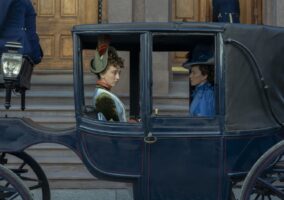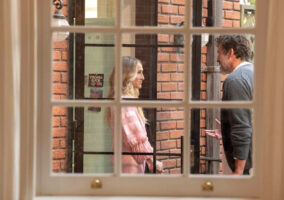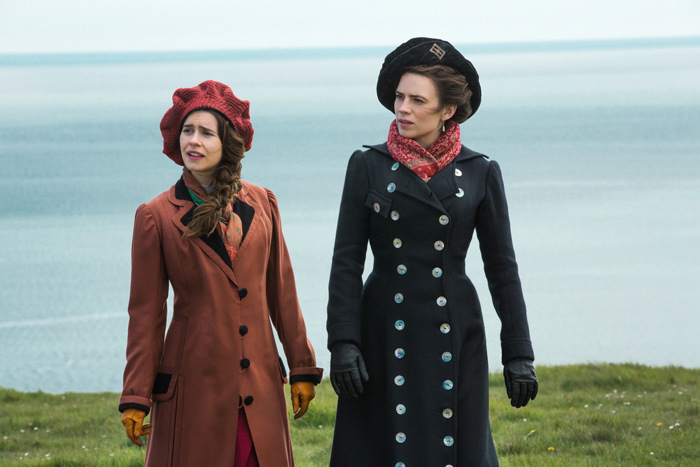
“My darling sister, it isn’t going to be at all what we expected.”
And with that opening line from a breathless letter to Margaret Schlegel sent by her sister Helen, this adaptation of E.M. Forster’s classic novel about class and social conventions in early 20th Century England is off and running – almost literally. While it never wanders one micron away from the conventions of an adaptation of this sort, it wants you to know (and mostly succeeds in conveying) that this version will be brisk, smart, probing and above all else, modern. In fact, we see it as a production that desperately wants to convey that latter aspect and might have slightly over-played its thinking with that thematically heavy opener. Swift-moving, bold, and social justice-heavy in its thinking it may be, but the Starz adaptation of Howards End deftly pushes all the costume drama buttons it can locate in the story.
You can expect – and indulge in – extended scenes of tea-pouring, skirt-swishing, calling card dropping, hat-wearing, horse-and-carriage riding, classical music-listening, “Good day to you, sir,” “Get the gentlemen his coat, please” “Do stay and sit”- style conversing, and of course, little touches here and there of hidden passions and forbidden desires expressed no more overtly than a sigh or a slightly too-strong compliment in polite conversation. Modern Victorian/Edwardian period dramas tend to work fairly hard to differentiate themselves from stuffy, PBS Masterpiece-style classics and Howards End is no different in that regard, but its main draw as entertainment is just how well it knows what the audience really wants to see and makes sure to give it to them in spades.
It is helped tremendously, as all period dramas are, by the casting. If you were to write a personality description of this version of Margaret, the words you use – brisk, smart, strong-willed, efficient, bright, engaging – would also be the correct words to describe the actress playing her, Hayley Atwell. The entire production centers around her character and her performance, and she’s more than up to the task. You can’t help but like her, even as the script makes clear that she can be impulsive, judgmental, and slightly overbearing. As examples, we offer her stinging assessment of Mr. Bast’s pedestrian tastes, thin face, and tattered cuffs, couched in an air of concern, as well as her first letter to Mrs. Wilcox, which was strangely harsh, followed by a barging-in on the woman to forcefully apologize. These are not, we think, random examples of her actions, but the core of her character as the script overtly describes her: a young woman seen past her prime (or closing quickly in on that state), who had to sacrifice a normal youth in order to raise her siblings on her own, making her fiercely protective of them, intense by the standards of the day, and subsequently slightly “off” in a social sense. Helen is portrayed somewhat similarly by the wonderfully cast Philippa Coulthard, except without any of the sense of anxiety about her future or grueling responsibility that tends to define a lot of Margaret’s actions. She is forceful, strong-willed, judgmental, passionate (classical music sure seems to have a … heady effect on her) argumentative and deeply concerned about an unjust world.
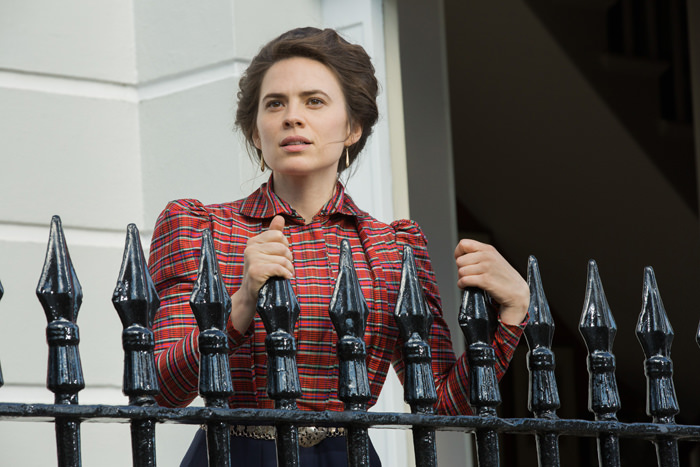
We point out the less-positive character traits of the two main characters because we think they’re important to this adaptation of the story, which seeks to cast questions of early 20th Century English social conventions in a broader, more modern light. That lightly rendered theme of social justice naturally turns its gaze back on the people who fight for it, if for no other reason than to put it in better context for a modern audience. But of course, the main quality of the Schlegel sisters is just how likeable they both are, and it’s a credit to screenwriter Kenneth Lonergan that he’s able to juggle portraying both sides of their characters so deftly and in such an entertaining manner.
In an interesting twist on Mr. Wilcox, Matthew MacFadyen offers a robust, youthful, masculine and downright sexy take on the character, even as he bellows exclamations of infuriating chauvinism that tend to dazzle the Schlegel sisters, who disagree with every word of them. Curiously – and we don’t know yet if this is a deliberate choice or a lack of chemistry – he seems totally unrelated to any of the members of his direct family. He speaks to them exactly as he speaks to bare acquaintances on the street; friendly and even boisterously, but very much at arm’s length. But he has chemistry in spades with Atwell and their brief scenes in the first episode underscore an attraction that goes beyond mere friendliness.
The cast is wonderful all the way through. Tracey Ullman isn’t really doing anything more than Maggie Smith-lite, but she’s appealing in the role and funny without ever pulling focus, which is not an easy thing for a comedic actress to do. Alex Lawther is funny and biting as little brother Tibby, and Joseph Quinn as Leonard Bast is heartbreakingly tense, nervous and overly formal. But the most notable casting may just be Rosalind Eleazar as Jacky, the “fallen woman” who spurs on so much of the narrative action just by existing. In this version, she exists as a woman of color, throwing a racial component into a story about Edwardian social conventions and upsetting the narrative chess board, so to speak. It’s a brilliant idea because it changes what you think you know about how the story is going to play out and it asks you to consider why you think of it that way. As of the first episode, however, these implications have yet to be touched on.
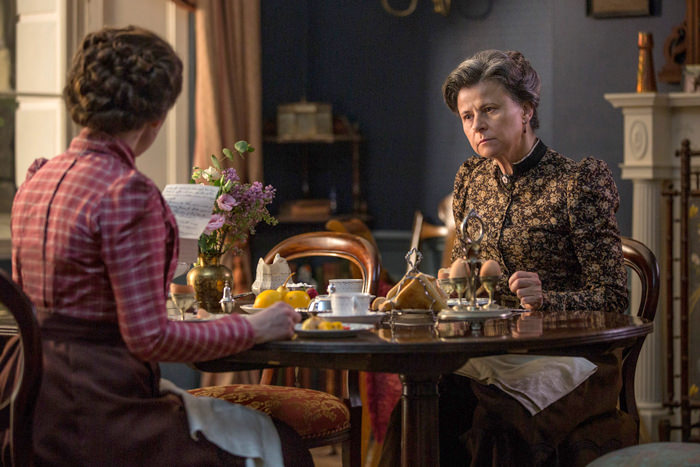
But we have to be honest. Yes, we’re interested in the social critique embedded in this adaptation and the modern perspective informing some of those critiques. We’re intrigued by the sexiness of the cast and the racial aspect now introduced to the story. But in the end, it’s the pure lush sumptuousness that really makes this adaptation worth tuning into. While the original Merchant Ivory production was not lacking for beautiful scenes, costumes and moments, this version is popping with color and energy. The sisters’ costumes (which we’ll be writing more about later) explode with pattern and brilliant hues in a way one doesn’t always see in sepia-toned period pieces. The drawing room and conservatory at Wickham Place are packed to the rafters with colorful fabrics and walls hanging with modern artwork. And the woods surrounding Howards End are so brilliant green you might think your screen settings are off. It’s a production more than willing to throw beautiful rooms, beautiful entranceways, beautiful gardens, beautiful clothes, beautiful settings and beautiful people at you while it tells its tale, offering a sort of less aristocratic, more bohemian, more self-critical Downton Abbey. It’s fast-talking, colorful, sexy, sumptuous and funny; an eminently modern take on a vintage tale. We can’t wait to dive in more.
We’re Not Ugly People: The Costumes of “Carol” and How They Define the Central Relationship Next Post:
Isabella Rossellini Did Not Come Quietly to the Dolce&Gabbana Alta Moda Event
Please review our Community Guidelines before posting a comment. Thank you!

